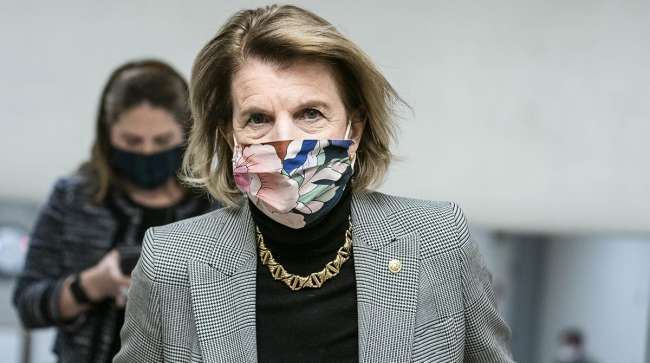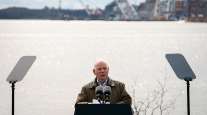Senior Reporter
Key Congressional Republican Calls for Bipartisan Highway Bill

[Stay on top of transportation news: Get TTNews in your inbox.]
As federal policymakers prepare to consider comprehensive highway policy legislation in the coming weeks, the top Republican on the U.S. Senate transportation committee reiterated calls for bipartisanship.
Sen. Shelley Moore Capito (R-W.Va.), the ranking member on the Environment and Public Works Committee, signaled the possibility for the panel to produce a meaningful multiyear highway policy bill with input from members on both sides of the aisle.
The country’s premier highway law expires in September.
For Republicans to back an update of that law, lawmakers would have to reconcile differences pertaining to policies, as well as funding.
Top Republicans are insisting the legislation focus on repairing surface transportation corridors. Democrats in the House and Senate majorities say they intend to produce climate change-centric transportation legislation meant to modernize nearly every system of travel. Neither side has recently approved a method to fund transportation programs.
“We need the give and take of this bipartisan process to produce legislation that can make it to the president’s desk,” said Capito on April 14. “It will take work from all levels of government and the private sector to meet the nation’s transportation infrastructure needs. We will have to take an all hands on deck approach.”
Specifically, Capito is proposing a highway bill that primarily enhances mobility options for commuters, improves connectivity along freight corridors and emphasizes safety and resilience for transportation projects. She would support dedicating resources for enhancing technologies across sectors within the infrastructure spectrum. The senator also has acknowledged a need for ensuring long-term funding for the nation’s highway system.

Carper
Capito’s colleagues echoed her calls for updating the country’s highway law. The panel’s chairman, Sen. Tom Carper (D-Del.), said he intends to take up a highway policy measure in the near-term. Both Democrats and Republicans have been questioning the long-term viability of the Highway Trust Fund, an account that relies on revenue from the federal fuel tax.
The trust fund assists state transportation agencies with roads, bridges and transit. Revenue from the 24.4 cents-per-gallon diesel tax, and 18.4 cents-per-gallon gas tax that feed into the trust fund will be insufficient to cover upcoming obligations. Since 2008, the trust fund’s revenue shortfalls have been covered via transfers from the general fund.
The EPW panel has been examining alternative user-based revenue streams meant to achieve sustainable funding for transportation programs. “We’re told that the average number of years a vehicle has on the road is about 15 years, so we’re going to be using gas and diesel for some time, but by less going forward,” Carper told colleagues.
There’s increasing attention devoted to the potential for adopting a national vehicle miles travel, or VMT, fee. The program would charge motorists for the miles they drive. House Transportation and Infrastructure Committee ranking member Sam Graves (R-Mo.) champions a VMT system. As he put it, “Funding our infrastructure should not be a political battle. It’s time to set a definitive path toward the long-term sustainability of the Highway Trust Fund, a path that is totally funded by all users of the system and not by insufficient gas taxes and deficit spending. This is how we realize the transformative projects everyone wants to accomplish.”

Graves
Stakeholders continue to warn congressional leaders about the trust fund’s looming shortfall. Douglas Shinkle, transportation program director at the National Conference of State Legislatures told senators on April 14: “Unless additional revenues or transfers are authorized, the [Highway Trust Fund] could diminish to the point that the U.S. Department of Transportation may have to delay payments to states for completed work. Late payments or reduced federal transportation spending to accommodate for the shortfall, is not an option for states.”
The White House has dismissed raising fuel taxes as part of President Joe Biden’s $2.25 trillion infrastructure plan. The president proposed raising the corporate tax rate from 21% to 28% to fund significant portions of his plan.
“Fundamentally, he does not believe that paying for this historic investment in rebuilding our nation’s infrastructure and creating millions of jobs should be on the backs of Americans,” said White House press secretary Jen Psaki, referring to a recent meeting between the president and members of Congress. “So he doesn’t believe that anyway; he’s proposed his own means of paying for it. But he was using [the gas tax] as an example of how it wouldn’t even make a sizable dent in paying for the package.”
Want more news? Listen to today's daily briefing below or go here for more info:




